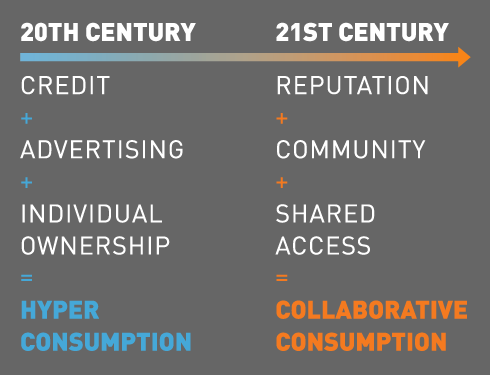“Collaborative consumption” is a new phrase that has entered our business and social lexicon. It signals the way some people are changing their consumption habits away from individual consumption and toward a focus on trading, sharing, bartering and lending within a community. And it’s happening in coworking.

Infographic on CollaborativeConsumption.com
In thinking about how coworking relates to collaborative consumption, it’s no question that coworking fosters the kind of atmosphere that allows for—and encourages—sharing and trading. As described on the about page of the Global Coworking Blog:
“Beyond just creating better places to work, coworking spaces are built around the idea of community-building and sustainability. Coworking spaces agree to uphold the values set forth by those who developed the concept in the first place: collaboration, community, sustainability, openness, and accessibility.“
Collaborative consumption is all about community and sustainability. Coworking is also about community and sustainability.
To make this idea of collaborative consumption a bit more tangible, following are some examples you may have heard of or used:
- Superfluid – allows people to collaborate by trading favors using “virtual currency”—in essence, bartering
- Zopa and CommunityLend – social lending
- Airbnb – a “community marketplace for unique spaces”
- Freecycle – a place to give and find stuff for free
- ZipCar – carsharing
- CouchSurfing – allows travelers to make connections with people, and rooms/couches, in the area they’re visiting
- Swap – swap books, CDs, movies and video games
- B-Cycle – bike sharing system
- Hyperlocavore – a yardsharing community
So, how might collaborative consumption happen in a coworking community?
- Trading skills/expertise with another member for mutual benefit (for example, a graphic designer creates a logo in exchange for a fellow copywriter creating newsletter content)
- Sharing resources (for example, several coworkers may pool their collective buying power to get lower rates at a local gym)
- Exchanging ideas (though collaborative consumption focuses mostly on products and services, brainstorming and ideating are still valuable “commodities”)
A recent post on the Global Coworking Blog highlights some of the ways that sharing and trading happens amongst coworkers. And another post discusses several of the ways that coworking can save a small business—including bartering and brainstorming.
Of course, this is not to say that sharing and trading are the be-all, end-all to community and economy; we all still have bills to pay and cold hard cash to tender. But this shift in thinking seems like it’s here to stay.
If this topic piques your interest, check out these insightful reads about collaborative consumption:
Infographic – GOOD.is: Sharing is Contagious
Article – Inc.com: Understanding the Consumer of the Future
Book – What’s Mine is Yours: The Rise of Collaborative Consumption
Book – The Mesh: Why the Future of Business Sharing
Have you shared your resources or skills with others at Cohere? What about this “collaborative consumption” worked? What didn’t work?
